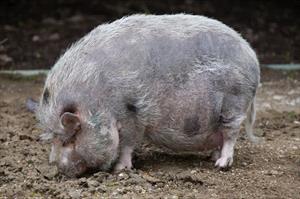Bob Judd, DVM, DABVP (Equine Medicine), DABVP (Canine and Feline Practice)
Pot bellied pig on ground

Photo courtesy of Depositphotos
You have probably heard about horses and humans having gastric or stomach ulcers, and pigs can also develop this problem. Gastric ulceration occurs in swine when an area of the stomach gets roughened and eventually erodes. Dr. Bruce Lawhorn, DVM, from Texas A&M University says that as the erosion worsens, bleeding and eventually perforation of the stomach occurs, which is deadly.
Gastric ulceration can happen in pigs for any reason that causes the pigs to go off feed for even just 2-3 days, occurring more commonly in the fall. Reasons for gastric ulcers in swine include feed that is too finely ground, a sudden change in feed, a vitamin E or selenium deficiency, excess whey in the diet, copper toxicity, and roundworms.
Pigs can also be infected by the swine variant of Helicobacter Pylori, which is an infectious cause of gastric ulceration. The disease usually occurs in rapidly growing swine and can lead to decreased appetite, vomiting, and dehydration. Treated swine will usually heal but the disease can recur, and untreated swine may be sick for several weeks and can die if the stomach is perforated.
Any pig that is off feed should be suspected of having gastric ulcers, whether it is a primary problem due to dietary issues or whether another disease like pneumonia has stopped the pig from eating and stomach ulcers have developed secondary to not eating. If the ulcers are severe, many pigs will bleed, and their mucous membrane color will be pale.
The disease can be treated with drugs to decrease gastric acid, drugs that coat the stomach lining, and injectable antibiotics. Since the affected pigs are usually not eating, you can give the medication in a slurry of oatmeal or fruit with a dose syringe given slowly in the mouth.
If a show pig goes off feed, consider feeding them a slurry as prevention to stomach ulcers.